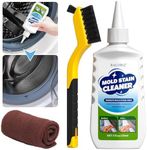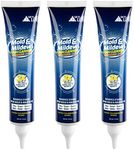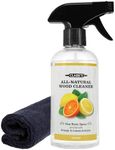Buying Guide for the Best Mold Shower Cleaner
Choosing the right mold and shower cleaner can make a big difference in how easily and effectively you can keep your bathroom clean and safe. Mold and mildew thrive in damp environments like showers, so a good cleaner should not only remove visible stains but also help prevent them from coming back. When picking a cleaner, it's important to consider how tough the stains are, what surfaces you need to clean, and any sensitivities you or your household may have to chemicals or scents. Understanding the key features of these products will help you select one that fits your needs and keeps your bathroom fresh and healthy.Active IngredientsActive ingredients are the chemicals or natural substances in the cleaner that actually break down and remove mold and mildew. This is important because different ingredients work better on different types of stains and surfaces. Some cleaners use strong chemicals like bleach, which are very effective at killing mold but can be harsh on surfaces and irritating to skin or lungs. Others use gentler, plant-based ingredients that are safer for people with sensitivities but may require more scrubbing or repeated use. If you have tough, set-in stains or need fast results, a chemical-based cleaner might be best. If you prefer a safer, eco-friendly option, look for natural ingredients, but be prepared for a bit more effort.
Surface CompatibilitySurface compatibility refers to whether the cleaner is safe to use on the materials in your shower, such as tile, grout, glass, plastic, or metal. This is important because some cleaners can damage or discolor certain surfaces. For example, bleach-based cleaners can erode grout or fade colored tiles, while acidic cleaners might harm natural stone. Always check the label to see which surfaces the cleaner is designed for. If your shower has delicate or specialty materials, choose a cleaner specifically labeled as safe for those surfaces to avoid accidental damage.
Ease of UseEase of use describes how simple and convenient the cleaner is to apply and rinse off. Some cleaners come in spray bottles for quick application, while others may require mixing or scrubbing. This matters because a product that's easy to use will encourage you to clean more regularly, keeping mold at bay. If you want a quick, low-effort solution, look for a spray-and-wipe formula. If you don't mind spending more time or need to tackle stubborn stains, a gel or foam that clings to surfaces might be more effective.
Scent and Fume LevelScent and fume level refers to how strong the smell of the cleaner is and whether it produces fumes that could irritate your nose, eyes, or lungs. This is important for your comfort and health, especially in small, poorly ventilated bathrooms. Some cleaners have a strong chemical odor, while others are fragrance-free or use natural scents. If you or anyone in your home is sensitive to smells or has respiratory issues, choose a low-fume or unscented product. If you like a fresh scent after cleaning, look for a cleaner with a mild, pleasant fragrance.
Mold Prevention AbilityMold prevention ability is how well the cleaner not only removes existing mold but also helps prevent it from coming back. This is important because showers are always damp, making them prone to recurring mold. Some cleaners include ingredients that leave a protective barrier or have long-lasting effects. If you want to reduce how often you need to clean, look for a product that advertises ongoing protection or mold prevention. If you clean frequently or don't mind regular maintenance, this feature may be less important.




















